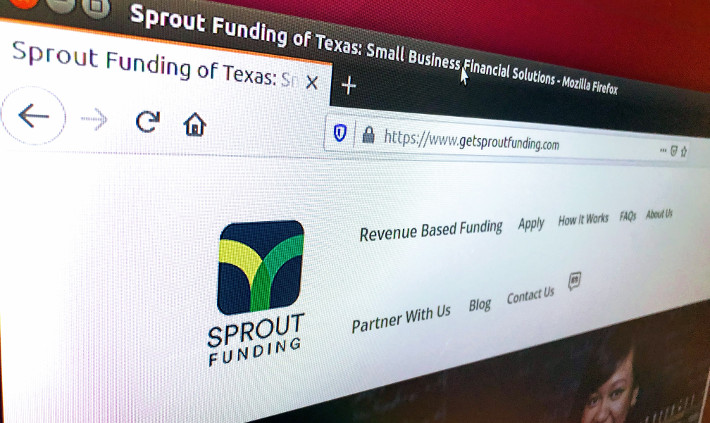Archive for 2020
Liberis Secures $42 Million in Funding, Plans American Expansion
February 3, 2020 Liberis, the London-based small business finance provider, secured £32 million ($42 million) in capital late last month following a round of equity fundraising. The firm, which has funded businesses through cash advances since 2007, has now raised a total of over £150 million ($197 million) via debt and equity.
Liberis, the London-based small business finance provider, secured £32 million ($42 million) in capital late last month following a round of equity fundraising. The firm, which has funded businesses through cash advances since 2007, has now raised a total of over £150 million ($197 million) via debt and equity.
Having already entered Nordic markets, Liberis looks to use this funding to further expand into Europe as well as make their mark in America. Speaking to deBanked, Liberis CEO Rob Straathof explained that the company would be working with its North American partner, Worldpay, to spread itself across all 50 states. Beyond Worldpay, Liberis is planning to create more partnerships with merchant acquirers, those payment platforms which serve merchants, or “SME champions,” as Straathof calls them.
Liberis will not be using brokers to provide cash advances to business owners in the States, the reason being that the company prefers to work with its affiliated partners. “We purely rely on our partners and integrating with our partners,” explained Straathof. “In the UK we still do brokers, but that’s kind of a legacy. It works very well for us and we have a great relationship with brokers. It’s a good channel for us, but we have no intention at this point to launch that in the US.”
The company will also use the funding to increase its staff by 30% in 2020, hiring around 50 people to bolster its 165-person workforce across their four offices in London, Dublin, Stockholm, and Denver.
Loan Brokers Attack Online Direct Lending in Super Bowl Commercial Duel
February 2, 2020
The battle is on between lenders and brokers in the mortgage space as middlemen try to out-compete push-button loan technology.
Quicken Loans ran a Super Bowl Commercial that featured Game of Thrones Actor Jason Momoa aka Khal Drogo and its Rocket Mortgage product. The theme, that of being super comfortable in your home, is a complete 180 from the controversial route the company took during a previous year’s Super Bowl that prompted a negative response from regulators and viewers. Even if you’re not in the market for a mortgage, Momoa revealing “his true self” is pretty humorous.
But not everyone is a fan of what online direct lenders are selling. FindAMortgageBroker.com criticized “playing with rockets” when it comes to mortgages and advocated working with an independent local mortgage broker instead. Why work with a broker they say? Because brokers work with various lenders instead of just one. The company goes as far as saying that brokers are faster, easier, and more affordable and they sign off with the hashtag, #brokersarebetter.
Check it out…
Appellate Court Affirms Decision in Merchant Funding Services, LLC v Micromanos Corporation etc.
February 1, 2020On January 29th, 2020 the Appellate Division, 2nd Department, of the Supreme Court of New York, upheld the original decision issued in Merchant Funding Services, LLC v Micromanos, etc. et al.. The case concerns a Confession of Judgment (COJ) filed following Micromanos’ default on a merchant cash advance contract. The defendants sought to vacate the COJ on the basis that the underlying agreement was allegedly a criminally usurious loan but the original judge ruled in favor of the plaintiffs.
The case was so notable that deBanked published a summary of the decision three years ago. Of particular interest is that the defendants not only lost but were accused by the judge of attempting to mislead the Court. Despite that, the defendants appealed.
The defendants have now lost again. The underlying case law they had relied on to support their arguments, Volunteer Pharmacy, was overturned the same day this decision was issued, leaving little room to wonder why the Appellate Division ruled accordingly.
One Of The Most Devastating Court Decisions Against Merchant Cash Advances Has Been Overturned
January 29, 2020 Merchant Cash Advances have sat on comfortable legal footing in New York ever since an appellate court ruled in favor of Pearl Beta Funding, LLC against Champion Auto Sales, LLC in 2018, but even so, it hasn’t stopped lawyers from trying to invalidate merchant cash advance (MCA) contracts on behalf of aggrieved customers.
Merchant Cash Advances have sat on comfortable legal footing in New York ever since an appellate court ruled in favor of Pearl Beta Funding, LLC against Champion Auto Sales, LLC in 2018, but even so, it hasn’t stopped lawyers from trying to invalidate merchant cash advance (MCA) contracts on behalf of aggrieved customers.
That’s because an MCA provided by New York-based Merchant Funding Services LLC to a business known as Volunteer Pharmacy in 2016 was ruled by New York Supreme Court Judge David F Everett to be so “criminally usurious on its face” that the normal process required to vacate a Confession of Judgment could simply be bypassed without even having to evaluate the merits of each side’s arguments and the matter automatically won in favor of Volunteer Pharmacy. The judge’s written decision, which voided the MCA contract ab initio, was replete with a scathing opinion of MFS’s business model.
The decision quietly stunned the merchant cash advance industry. MFS understandably appealed.
Dozens of lawsuits against MCA companies in the ensuing years went on to cite Judge Everett’s decision in Volunteer Pharmacy with limited success. And while the industry sat around to find out what would happen in that case, Pearl Beta Funding, a rival to Merchant Funding Services, won an appeal of its own, the landmark usury case in March 2018 that seemingly solidified once and for all the commonly held understanding that such MCA agreements were not usurious.
Despite this, the uncertainty of Volunteer Pharmacy still lingered in the background, that is until now.
On January 29th, 2020 the Appellate Division, 2nd Department, of the Supreme Court of New York, overturned Judge Everett’s decision and ruled in favor of Merchant Funding Services. The panel of judges said they need not even weigh a lot of Everett’s contentions because he was wrong on the underlying procedural issue, that a judgment by confession could be vacated in such an instance without having to go through the normal legal process.
The ruling ultimately provides clarity on the process that determines how a judgment by confession can be vacated. One major impact is that lawyers seeking to invalidate merchant cash advance agreements will no longer have Volunteer Pharmacy as a crutch to rely on.
Former Wells Fargo CEO Fined $17.5 Million
January 27, 2020 Last week the Office of the Comptroller of the Currency released a 100-page report on the Wells Fargo fake accounts scandal that came to light three years ago. Accompanying the document with a fine against the CEO who oversaw the controversy, John Stumpf, for $17.5 million.
Last week the Office of the Comptroller of the Currency released a 100-page report on the Wells Fargo fake accounts scandal that came to light three years ago. Accompanying the document with a fine against the CEO who oversaw the controversy, John Stumpf, for $17.5 million.
Stumpf, whose personal wealth was estimated to be roughly $200 million prior to the scandal, also had all of his stock options rescinded by Wells Fargo, totaling $69 million that was returned to the bank.
Being the largest ever fine to be levied against an individual by the OCC, the news contrasts regulators’ reactions to previous outrages, such as JPMorgan Chase’s London Whale fiasco as well as the ’08 financial crisis, both of which saw executives escape personal scrutiny in lieu of the institutions themselves being subject to penalties. And while Stumpf’s fine breaks records, it may not hold the top spot for long, with the OCC eyeing a follow-up charge against Carrie Tolstedt, who ran the division of Wells Fargo most involved in the scandal, for $25 million.
Stumpf was charged alongside seven others who were implicated in 2016 for opening millions of allegedly fake accounts to meet sales targets. Such goals being set by higher-ups in the 168-years-old bank were passed down to mid- and low-level employees, fostering a culture that promoted the idea of cheating or being fired, according to the OCC’s report.
Employee testimonies allege that one branch manager threatened to transfer those workers who did not meet targets to “a store where someone had been shot and killed,” whereas another employee and Gulf War veteran wrote to Stumpf noting that working for Wells Fargo proved to be more stressful than a war zone.
The filings also described an atmosphere of surveillance, mentioning that “The bank had better tools and systems to detect employees who did not meet unreasonable sales goals than it did to catch employees who engaged in sales practices misconduct.”
Reactions to the scandal have been scathing, with Congress having drilled Stumpf’s replacement, Tim Sloan, during hearings last year. Democratic presidential nominee candidate Elizabeth Warren came out during the week with guns blazing for the bank. “Giant banks like Wells Fargo only clean up their act when their executives know they’ll face handcuffs when they preside over massive fraud,” the Massachusetts Senator said in a statement on Thursday. “Tomorrow morning, former Wells Fargo CEO John Stumpf will wake up to his cushy retirement while the thousands of low-level branch employees who took the fall for him – and the hundreds of thousands of consumers who were cheated on his watch – continue to deal with the repercussions of his scams.”
Sloan ended up taking a forced retirement in March 2019, with Charles Scharf stepping in as CEO. Speaking on his first earnings call since assuming leadership of the bank, Scharf addressed the scandal, keeping the book open on investigations into wrongdoing. “I just want to be clear, I’m not suggesting here that any of these public issues will be closed this year.”
New Jersey Tries Again With a Small Business Finance Disclosure Bill
January 26, 2020 For the third year in a row, New Jersey has a small business finance disclosure bill on the table. S233 is the latest iteration of S2262 from prior years.
For the third year in a row, New Jersey has a small business finance disclosure bill on the table. S233 is the latest iteration of S2262 from prior years.
Introduced by State Senator Troy Singleton, the proposed law would impose disclosures on loans, factoring, and merchant cash advances on transactions less than $500,000.
In addition to APR requirements, brokers who arrange such financing would be required to disclose their fee to prospective applicants separately from the financing contract and prior to the consummation of the transaction.
Singleton is a Democrat. The Democrats in New Jersey control the Senate, Assembly, and Governor’s office.
The Scoop Behind Sprout Funding’s Acquisition of Jet Capital
January 25, 2020 News from North Texas this month as Dallas-based Sprout Funding announced its acquisition of Jet Capital. The move comes as Sprout seeks to expand its technical operations.
News from North Texas this month as Dallas-based Sprout Funding announced its acquisition of Jet Capital. The move comes as Sprout seeks to expand its technical operations.
“Sprout built a reputation as a group that funds a lot of its own internal deals, and Jet had spent a lot of time, energy, and money on their tech platforms,” Sprout’s CEO and Founder Brad Woy told deBanked. “So while we were really good on the sales and marketing side, they seemed to be a little bit more advanced in their tech and reporting, and we brought those two things together.”
Almost all of Jet’s employees will be joining Sprout, with the exception of one person who chose to go their separate way following the merger.
Jet’s COO Allan Thompson spoke kindly of the purchase, saying in a statement that “There is a great cultural alignment in addition to the obvious benefits of combining our technology, processes and people. The result will provide increased capabilities for Sprout and opportunity for all of our customers and partners.”
The financial terms of the acquisition were not disclosed.
Sun Shines on deBanked CONNECT MIAMI for Another Year
January 24, 2020 Two blocks back from where the waves were washing up on Miami Beach, attendees flocked into the halls of the Loews Miami Beach Hotel. A mix of brokers, funders, lawyers, and anyone else attracted to alternative finance made up the crowd of the 2020 outing of deBanked Connect Miami.
Two blocks back from where the waves were washing up on Miami Beach, attendees flocked into the halls of the Loews Miami Beach Hotel. A mix of brokers, funders, lawyers, and anyone else attracted to alternative finance made up the crowd of the 2020 outing of deBanked Connect Miami.
They had come for the speakers and talks, the networking opportunities, and, of course, the weather; the first of these being a mix of topics and characters from across the industry. But before the talks could properly kick off, deBanked’s President and Founder Sean Murray took to the stage to welcome attendees and announced the publication’s latest news: the utility of www.seekingfin.com and the administration of two large social media groups, Merchant Cash Advance on Facebook and Merchant Cash Advance Resource on LinkedIn.
 Following on from Murray’s introduction, Brian Holloway, former Patriots Offensive Lineman, opened the show with an impassioned speech alongside his son on how to translate your passions and determination into sales maximization, citing the mantra of “Let’s move as the champions move.” A collection of industry figures including United Capital Source’s Jared Weitz, Elevate’s Heather Francis, and alternative finance veteran David Goldin discussed the challenges and changes that businesses are likely to face when making money in 2020 – including what to be aware of when considering syndication and how to build a book. And closing the show were Gunes Kulaligil from Methodical Management alongside Hans Thomas of 10X Capital, who broke down how to accurately value yourself and your company’s worth.
Following on from Murray’s introduction, Brian Holloway, former Patriots Offensive Lineman, opened the show with an impassioned speech alongside his son on how to translate your passions and determination into sales maximization, citing the mantra of “Let’s move as the champions move.” A collection of industry figures including United Capital Source’s Jared Weitz, Elevate’s Heather Francis, and alternative finance veteran David Goldin discussed the challenges and changes that businesses are likely to face when making money in 2020 – including what to be aware of when considering syndication and how to build a book. And closing the show were Gunes Kulaligil from Methodical Management alongside Hans Thomas of 10X Capital, who broke down how to accurately value yourself and your company’s worth.
Running throughout these talks, just off from the general session room, the sponsors hall was abuzz with deals and networking. With business cards exchanged, rumors swapped, and trends discussed, the hall served for the day as a focal point for the industry.
And as the sun set on South Beach, the speakers wrapped up and the sponsors wound down their tables. The audience billowed out into the courtyard, where the lasting Miami heat accompanied food, cocktails, and conversation, as deBanked Connect Miami closed for another year.






























